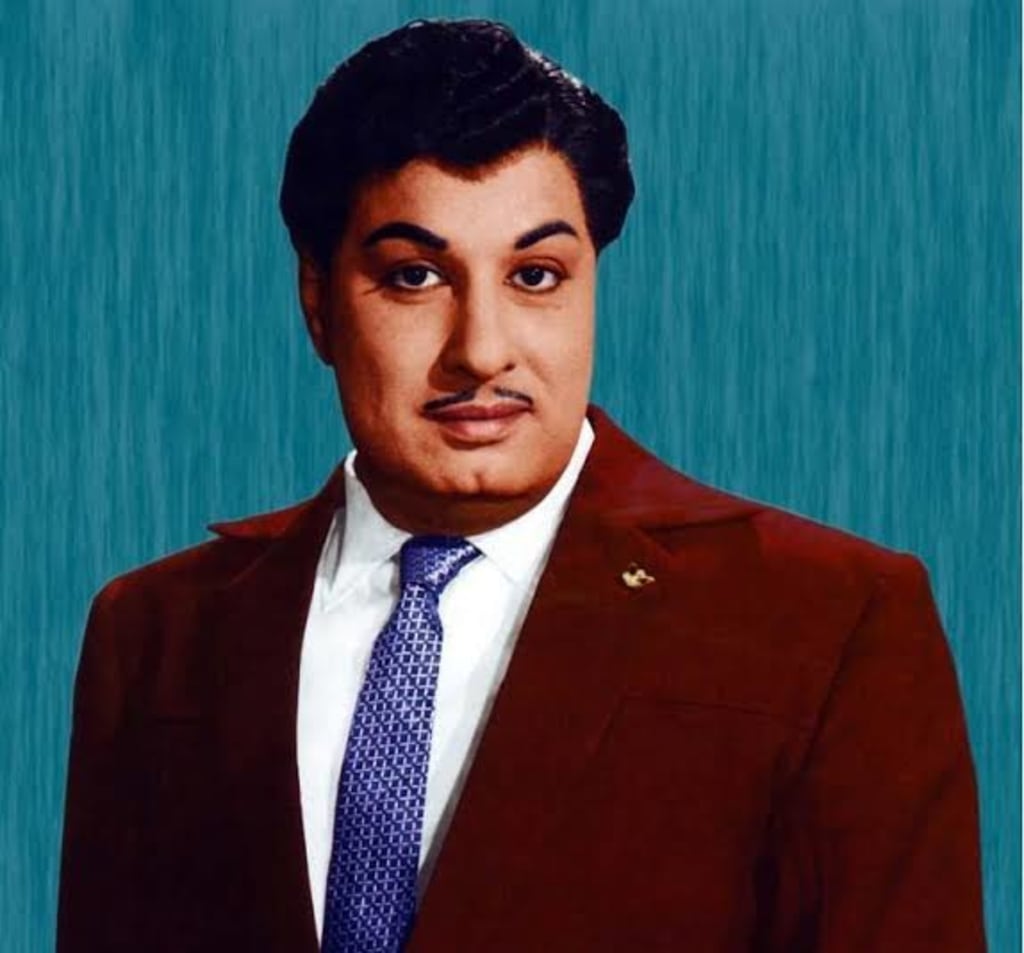MGR history
“IT IS NOT enough if you are a good man

Start writing... “IT IS NOT enough if you are a good man,” he said, “You must also appear to be so… You put forward an image of yourself if you want to get anywhere.” No one followed his words as assiduously as he himself did, though unaware, it seems, of the risks of getting ‘trapped’ in his own image. MG Ramachandran (1917-1987), a Malayalee born in Sri Lanka, matinee idol and the heart-throb of millions of adoring fans who became Tamil Nadu’s most popular mass leader, reworked the narrative of a state that had witnessed a resurgence of Tamil pride.Tamils elected him as Chief Minister of the state for two terms and more, and he was in power from 1977 until his demise in 1987. They voted him to power even when he was ailing and far away, being treated across the seas in the US. They worshipped him as a god and even built a temple with an enshrined image of him in his trademarks fur cap, dark glasses and gold watch. It was under him that Tamil Nadu shifted from its fiery Dravidian ideology of self-respect to a poster cult. The rest of the nation was baffled by the ‘MGR phenomenon’, but this made no difference to his followers.How much of MGR’s mystique was engineered? How meticulous was the strategy drawn out to win over the masses? How much political thinking was behind the myth? Once a reporter asked him, “When you fight your enemies in films, you beat up ten to twenty of them single handedly and come out victorious. Can anyone believe this?” MGR answered, “In the Mahabharata, the young Abhimanyu fights experienced warriors. He breaks complex strategies and defeats enemies. If Abhimanyu can do that, film heroes like me can also do the same.” But if MGR’s approach was as sharp as that of Abhimanyu in breaking through to enter the chakravyuh in the battlefield of Kurukshetra, his was even better in working out the aftermath: for he knew how to successfully come out of it, something poor Abhimanyu did not.The phenomenal rise and success of MGR as an actor and later as a politician, and the waves of emotion that his name continues to evoke among the state’s common people 30 years after his death, is something of an enigma.Marudur Gopalamenon Ramachandran (MGR) was born on January 17th, 1917, in Kandy, Sri Lanka. His father Gopala Menon died when he was barely a child and left the family penniless. Ramachandran’s mother Sathya moved to India with her children and settled in Kumbakonam, Tamil Nadu. Hunger claimed the lives of his two sisters and an elder brother. Driven by extreme poverty, he embarked on an acting career as a child theatre artist at the age of seven, and joined the Madhurai Original Boys.Company, owned by M Kandasamy Pillai. Ramachandran was fair complexioned and was given female roles initially. It was after a long struggle that he got a break in cinema, doing small parts in mythological films. He then took to action films, which were to become his forte. Critics never thought much of his talent as a performer, though his films broke records at the box office. He also won a National Award for his role in Rickshaw Karan, a 1971 vigilante film.Despite amassing great wealth and becoming the most powerful man in the state for a long spell, his identification and empathy with the poor was legendary. In his essay on the leader, ‘The Image Trap’, the social scientist MSS Pandian argues that MGR carefully created a screen image that corresponded to ‘the cultural presuppositions’ of Tamil Nadu’s subaltern classes as manifested in the state’s folk-hero ballads. The typical MGR hero is a low-status underdog who acquires the power to dispense justice, uses education as a tool of struggle, and defends the honour of women. All this held a tremendous appeal for the poor. The ‘common sense’ of ordinary people, writes Pandian, was something that ‘MGR effectively manipulated to his own political advantage’. Whether it was a deliberate strategy or not, the range of roles MGR played onscreen elicited the empathy of many who saw real-life situations reflected in his films. His cinema dealt with a variety of popular demands, including the provision of land to live on, food and clothing, education, freedom from usury, higher wages, lower prices and an end to violence against women and the poor.He had no strong political beliefs. The regional thrust of Dravidian politics had taken a beating with MGR distancing himself from opposition parties demanding more power for the states.The extraordinary appeal of MGR rested on the fact that his film and political careers were closely intertwined ‘in a remarkably symbiotic manner’ that gave him an unbeatable image as a folk hero. His involvement with the Dravida Munnetra Kazhagam (DMK) started in 1953 and he was made a member of the party’s General Council in 1956. That he was so closely identified with the DMK, and the DMK with him, was important in its impact. When people watched him onscreen, the party’s message became his message.The importance of MGR’s association with the DMK can hardly be underestimated. The reason for his success cannot be attributed to his star status and convincing portrayals of the invincible good guy alone. Several film stars have tried their luck in politics—Shivaji Ganesan, for instance who was a greater actor and just as popular—but none has been even remotely as successful as MGR was. The story of Rajinikant, who achieved superstar status as bewildering as that of MGR, again falls short in the sense that his appeal is narrower. Rajini’s anti- hero image, the irreverent, smoking, drinking woman-basher, appealed only to the disaffected male in search of an identity, and definitely not the female audience.Moreover, Rajini lacks the mass base provided by a cadre of committed party workers that MGR enjoyed. Also, MGR’s close associates worked hard on his image, keen to project the positive side of him in contrast with the negative propaganda they spread against M Karunanidhi, the rival DMK leader who became Chief Minister after the party’s first leader to occupy the position, CN Anna Durai, passed away in 1969.It was MGR who convinced his party colleagues that Karunanidhi ought to assume leadership. Yet, it was Karunanidhi who had the ‘audacity’ to expel MGR from the party when the latter, as DMK treasurer, openly demanded an explanation of discrepancies in the party’s accounts and challenged ministers and legislators to declare their assets. One week after his expulsion in 1972, MGR announced the formation of his new party, the All India Anna Dravida Munnetra Kazhagam (AIADMK). The rest is history. People voted him to power for two successive terms and Karunanidhi could not challenge MGR as long as he was alive.MGR’S ASSOCIATES WERE,understandably, worried about his fascination with Jayalalithaa, a convent- educated, English-speaking Brahmin woman 30 years younger than him who had been his co-star in a number of films. They were anxious about how their closeness could hurt the impeccable image they had helped him craft. They tried their best— with part success—to keep her away from him, little realising that it was she who would assume his political legacy upon his death and rule Tamil Nadu for even longer than her mentor.It was the acceptance of MGR’s fan base that Jayalalithaa was relying on when she projected herself as the de facto leader of the AIADMK. The Chief Minister had made her the party’s propaganda secretary and the cadres never doubted her claim that she was his chosen heir. If MGR was their annan (elder brother), she was accepted as their anni (sister-in-law). They were not aware that their hero had left her in limbo when he died this no position or title to fend for herself, betrayed by the man who had brought her into politics with promises of a great future.The magic spelt by MGR was such that Jayalalithaa would invoke his name at every election campaign. Never mind if it became just lip service once she was sure her own name had achieved the same.The political edifice that MGR built, however, was formidable. His heroic image was strengthened by acts of charity off screen. He earned fame for his generosity and helpfulness. He was always the first to donate large sums for disaster relief. He was constantly in the news as one aiding orphanages and schools. After a spell of torrential rains in Madras, he once had raincoats emblazoned with the party insignia distributed to some 6,000 rickshaw waalaa. To be sure, his generosity was well advertised. Poor and old women would be planted by roadsides for him to stop his car and hug them for the cameras, asking an assistant to shove some currency notes in their outstretched palms.People trusted him and voted for him in droves. Yet, he had no strong political beliefs, not even an ideological sense of mission. The regional thrust of Dravidian politics had taken a beating with MGR distancing himself from opposition parties of the time that were demanding more power for the states. He was smart enough to realise that so long as the state depended on the Centre for funds, an anti-Centre stance made no sense. The anti-Brahmin plank of Periyar, whose ideas had inspired the Dravidian movement, carried little conviction for the AIADMK; the party’s propaganda secretary, Jayalalithaa, and a cabinet minister, HV Hande, were both Brahmins. MGR also soft-pedalled the issue of opposing north India’s imposition of Hindi on the south, and was not as vociferous as Karunanidhi in espousing the cause of Sir Lanka’s Tamils. MGR’s desire to water down the regional character of his politics was clear when he renamed his Anna DMK as ‘All India’ Anna DMK. Atheism as an ideological tenet took a back seat too. MGR was a believer and made no secret of it. Gods were resurrected and money doled out for the renovation of temples.MGR will nevertheless go down in history as the leader who introduced the most far-sighted welfare measure that any state had: free midday meals for 8 million school children in Tamil Nadu. “I have suffered hunger and poverty in my life,” he would often say, “I know the suffering of my mother, who could not give us a ball of rice when we returned from school. Till my last breath, I will work for the people so that no mother in Tamil Nadu will suffer the way my mother did.” The message was laden with emotion and the scheme endeared him to the poor. The programme is reported to have increased the enrolment of pupils, improved children’s health and given employment to 200,000 people, mostly women.The meal scheme apart, MGR had little else to brag about. In 1977, he had led the AIADMK to triumph in the state Assembly elections by campaigning on an anti-corruption platform. At a time when numerous charges of graft were being laid at the door of Karunanidhi’s DMK government, it went down well. The matinee idol turned politician would repeat the formula in the next polls, but towards the end of his tenure in office, he himself faced a raft of such allegations. MGR’s administration was generally seen as inefficient. Government decision-making was overly centralised in his hands, with the result that files moved slowly, if at all. The Chief Minister had an obsessive concern with secrecy, the administrative machinery was demoralised, police repression in the state was growing, and the use of the intelligence apparatus for political eavesdropping led to an air of suspicion and fear that also pointed to the government’s poor record on civil rights. An anti-press law put journalists in the dock. It made ‘scurrilous and indecent’ writing a cognisable offence punishable by a prison term varying from two to five years. The MGR government also passed a bill to curb the screening of films critical of legislators and ministers. This legislation was provoked by the success of Neethikku Thanda Nai, a 1987 film scripted by Karunanidhi that was critical of MGR’s rule. The state gained notoriety for police atrocities.the officially sanctioned killing of 22 young men in North Arcot and Dharmapuri in the guise of encounters, for example and custodial deaths. The number of people detained without FIRs was shockingly high, and the harassment of students, journalists and publishers too severe to escape notice.The regime’s prohibition policy, brought in with much fanfare to wipe the tears of ‘Motherland’ (community of mothers), had become a farce with vast multitudes drinking openly even though the consumption of alcohol without a permit was punishable by law. Industry was no happier and the state’s economic performance was lacklustre. The matinee idol had no clear-cut agenda. And yet, the MGR magic stayed on, despite ill health and periodic absences from India for medical treatment in the US. For the last three years of his rule, his speech was so impaired as to render him voiceless.None of MGR’s shortcomings diminished the adoration that the masses specially women voters and the poor had for him because of his welfare schemes. While these were freebies at the cost of economic growth, they became a success mantra that even rivals had to adopt. Karunanidhi, for example, followed a similar strategy to win the 2006 Assembly elections.The magic spelt by MGR was such that Jayalalithaa would invoke his name at every election campaign. Never mind if it became just lip service once she was sure her own name had achieved the same. If she outdid her mentor on handouts for the masses, she also went further in instilling fear among dissenters. From anni, she was to become Amma, the Universal mother. Yet, she never failed to end her speeches with ‘MGR ’ (long live MGR’s name). It will be difficult for Tamil politics to extricate itself from such an image trap.






Comments (1)
Connecting with someone https://banksnear-me.com/bank-of-america-near-me/ emotionally, emotionally and physically can be great. But you have to do a lot of work to build a good relationship.